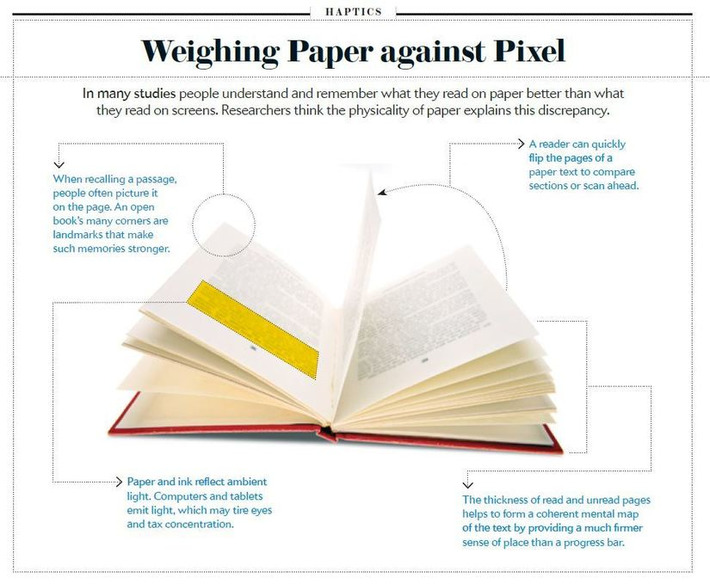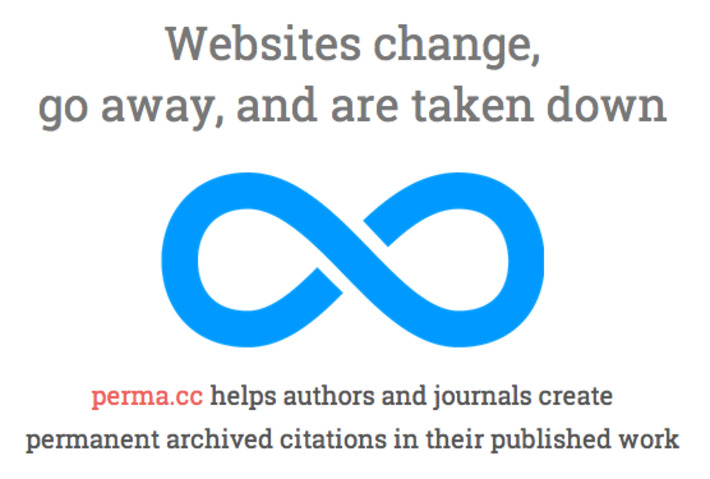There is good news for those who enjoy paper and print! An article in the recent November 2013 issue of Scientific American magazine clearly supports what we already know: most people understand and remember text better when read on paper rather than a screen. According to the article, while e-readers and tablets are becoming more popular as these technologies improve, reading on paper has many advantages.
Get Started for FREE
Sign up with Facebook Sign up with X
I don't have a Facebook or a X account
 Your new post is loading... Your new post is loading...

Deanna Dahlsad's curator insight,
October 15, 2013 3:59 PM
Robin Good of Content Curation World breaks the findings down thus: a) what people curate as relevant is not generally among the top ranked results according to popular metrics. Good stuff is not the same as what is considered normally popular or authoritative stuff. b) content curation allows a community to synchronize around specific issues and subjects (as anticipated by Clay Shirky) c) better and more appreciated curation is of the "structured" kind, providing additional info, meta-data and categorization. d) curators that are highly appreciated are characterized by consistent activity and by a variety of interests (or viewpoints under the same theme) that they are capable to cover. This is rather my experience; however, I usually explain it to my clients this way: a) You can be doing an excellent job, but never receive the recognition, popularity, or traffic you deserve.That doesn't mean you won't be appreciated greatly by the smaller group of people who do find/read your curated works. b) No matter the popularity of your curation, you can build and have conversations -- but remember, community cultivation not only requires additional time, but a different skill set. c) If you're going to do it, do it well. Use tools, such as labels and tags, and *always* provide context as well as proper credits and links. d) Consistent activity is nearly as important as showing some personality along with your knowledge. Your topic may be narrowly focused, but offer additional topics and information about you personally (not just professionally) so that people get a sense of you. 
Carmenne Kalyaniwala's curator insight,
October 16, 2013 2:17 AM
A research paper by Zhong, Shah, Sundaravadivelan and Sastry, King's college London, 2013 
AnneMarie Cunningham's curator insight,
October 17, 2013 8:28 AM
See the excellent notes from Robin Good below. Interesting to see more work emerging in this field.

Blaithan Michael Altenburg's curator insight,
September 24, 2013 3:11 PM
This is good that they are helping 
Prof. Hankell's curator insight,
September 25, 2013 10:33 AM
Robin Good's insight:
Perma.cc is an upcoming web service that aims to help authors and journals create permanent archival copies of their online published content.
Way too often in fact, due to a multitude of reasons, not only content gets moved and relocated to new sites, becoming more difficult to find but in many others it is permanently deleted or lost.
To comfort your doubts that this is a true and tangible issue, you should check the work being carried out by Kendra Albert, Larry Lessig and Jonathan Zittrain, who are completing a study of link rot, available at http://papers.ssrn.com/abstract=2329161. ;
Link rot is the phenomenon by which material we link to on the distributed Web vanishes or changes beyond recognition over time.
Believe it or not half of the links in all of the Supreme Court opinions, don't work anymore.
In this context "the Harvard Library Innovation Lab has pioneered a project to unite libraries so that link rot can be mitigated. We are joined by about thirty law libraries around the world to start Perma.cc, which will allow those libraries on direction of authors and journal editors to store permanent caches of otherwise ephemeral links."
The Internet Archive has provided its powerful archiving engine to support this effort and Cloudfare its distributed CDN.
The official tagline of the upcoming site reads: "perma.cc helps authors and journals create permanent archived citations in their published work"
Here is essence what you should expect from it: "Perma.cc allows users to create citation links that will never break. When a user creates a Perma.cc link, Perma.cc archives a copy of the referenced content, and generates a link to an unalterable hosted instance of the site. Regardless of what may happen to the original source, if the link is later published by a journal using the Perma.cc service, the archived version will always be available through the Perma.cc link."
N.B.: While anyone will be able to go to Perma.cc and archive any web page this resource is designed for researchers, authors and journals. In this light Perma.cc downloads the material at the designated URL and provides a new URL (a “Perma.cc link”) that can then be inserted in a paper. After the paper has been submitted to a journal, the journal staff checks that the provided Perma.cc link actually represents the cited material. If it does, the staff “vests” the link and it is forever preserved. Links that are not “vested” will be preserved for two years, at which point the author will have the option to renew the link for another two years.
My comment: Can't wait to test it. We need these type of archival tools like oxygen. It's not only important that we organize and curate what is important from the web, but it is essential that we also take care in preserving it for the longest possible time.
Free and open to all (soon).
Request beta access here: http://perma.cc/ ;
More info: http://blogs.law.harvard.edu/futureoftheinternet/2013/09/22/perma/ ;
Similar Tools: www.Permamarks.com 
Steve Tuffill's curator insight,
September 25, 2013 11:47 AM
Essential, if the Internet is our all-time library resource... |

Curated by Deanna Dahlsad
An opinionated woman obsessed with objects, entertained by ephemera, intrigued by researching, fascinated by culture & addicted to writing. The wind says my name; doesn't put an @ in front of it, so maybe you don't notice. http://www.kitsch-slapped.com
Other Topics

A Marketing Mix
Adventures in advertising and marketing - the contemporary, the historical, and the hysterical. http://deanna.dahlsad.com/

Antiques & Vintage Collectibles
Collecting old things; heirlooms and new to you things! Companion to http://www.inherited-values.com/

Colorful Prism Of Racism
Racism past and present. Companion to http://www.kitsch-slapped.com/category/colorful-prism-of-racism/

Consumption Junction
Consumerism meets marketing; who & what manipulates the free market of goods & services. See also: http://www.kitsch-slapped.com/category/ze-big-mouth-promotions-stuff/

Crimes Against Humanity
From lone gunmen on hills to mass movements. Depressing as hell, really.

Cultural History
The roots of culture; history and pre-history.

Dare To Be A Feminist

For Art's Sake-1
Art, crafts, and the people who make them. To inspire and purchase. Companion to http://www.ululating-undulating-ungulate.com/

Herstory
History as this woman sees it. The serious, the kitsch, the opinionated. Companion to http://www.kitsch-slapped.com/

In The Name Of God
Mainly acts done in the name of religion, but also discussions of atheism, faith, & spirituality.

Kinsanity
Let's just say I have reasons to learn more about mental health, special needs children, psychology, and the like.

Kitsch
Mostly vintage and retro "badness" but you can decide how delicious it is. http://www.kitschy-kitschy-coo.com/blog/

Nerdy Needs
The stuff of nerdy, geeky, dreams.

Readin', 'Ritin', and (Publishing) 'Rithmetic
The meaning behind the math of the bottom line in publishing and the media. For writers, publishers, and bloggers (which are a combination of the two).

Sex Positive
Sexuality as a human right.

Vintage Living Today For A Future Tomorrow
It's as easy to romanticize the past as it is to demonize it; instead, let's learn from it. More than living simply, more than living 'green', thrifty grandmas knew the importance of the 'economics' in Home Economics. The history of home ec, lessons in thrift, practical tips and ideas from the past focused on sustainability for families and out planet. Companion to http://www.thingsyourgrandmotherknew.com/

Visiting The Past
Travel based on grande ideas, locations, and persons of the past.

Walking On Sunshine
Stuff that makes me smile.

You Call It Obsession & Obscure; I Call It Research & Important
Links to (many of) my columns and articles.
|














Amen! Nice to know I am not crazy. ...Well, at least for my thoughts about reading on paper. ;)